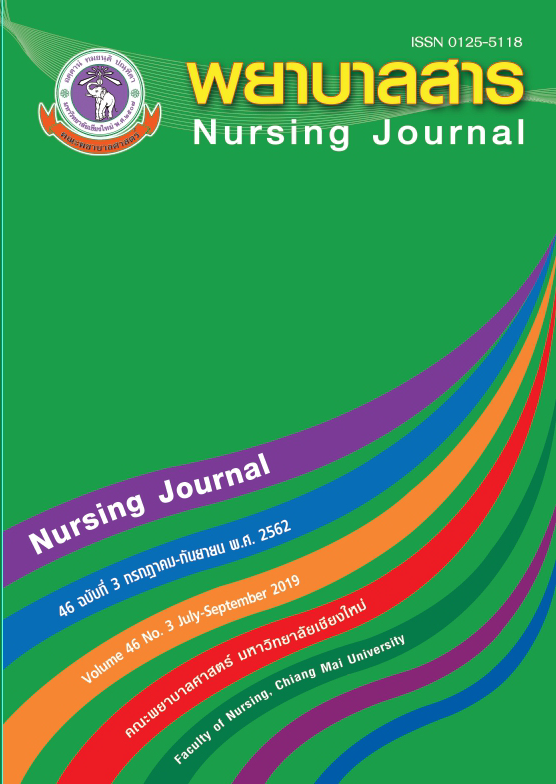Knowledge and Attitude Regarding Advance Directives for End of Life Care Among Physicians and Nurses
Keywords:
Advance directives, Living will, End of Life Care, Knowledge, AttitudeAbstract
The purpose of this descriptive study was to describe the knowledge and attitudes regarding advance directives for end of life care among physicians and nurses. The study sample consisted of 209 medical doctors and 316 nurses working at a university hospital. The instruments used in this study included the demographic data recording form, the Knowledge Regarding Advance Directives for End of Life Care questionnaire, and the Attitude Regarding Advance Directive for End of Life Care questionnaire. These instruments were developed by the researcher based on the National Health Act 2550, Section 12 and after reviewing literature regarding advance directives. The content validity and reliability were ascertained for all instruments. Data were analyzed using descriptive statistics.
The study results revealed that
- More than half of physicians (52.15 %) had knowledge regarding advance directives for end of life at a high level, while 36.85 % had a moderate level of knowledge.
- Most nurses (73.10 %) had a high level of knowledge regarding advance directives for end of life, while 25.30 % had a moderate level of knowledge.
- More than half of physicians (55.50 %) had a moderate level of attitude regarding advance directives for end of life, while 44.50 % had a high level.
- Most nurses (62.66 %) had a moderate level of attitude regarding advance directives for end of life, while 37.34 % had a high level.
The findings of this study can be used as a baseline for further development about the knowledge and attitudes of physicians and nurses regarding advance directives. These findings highlight the need for interventions to promote knowledge and attitudes among health personnel. Further research should be done to identify effective interventions for promoting knowledge and attitudes among physicians and nurses.
References
Akarathanarak T., Kongsuwan W., & Matchim Y. (2014). New Registered Nurses’ Knowledge in Caring for Patients at the End of Life. Songklanagarind Journal of Nursing, 34(2), 103-116. (In Thai)
Boonchalermvipas S. (2008). End of patients’ life (a medical fact with legal limits). In Lertsanguansinchai P., Nuchpayoon I., Chatkaew P., & sittipan C. (Ed.), End-of-life care (pp.397- 404). Bangkok: Aksorn Sampan(1987). (In Thai)
Hanprasitkam K., Patoomwan A., Churaitatsanee S., & Paisansuthideth U. (2013). The Effect of an End-of-Life Care Education Program on Nurses’ Knowledge, Attitude, and Practice in Caring for End-of-Life Patients. Rama Nursing Journal, 17(1), 126-140. (In Thai)
Iglesias, M. E. L., & de Bengoa Vallejo, R. B. (2013). Living wills in the nursing profession: knowledge and barriers. ActaBioethica, 19(1), 113-123.
Kim, S. S., Lee, W. H., Cheon, J., Lee, J. E., Yeo, K., & Lee, J. (2011). Preference for advance directives in Korea. Nursing Research and Practice, 2012. doi: 10.1155/2012/873892
Lee, J., & Kim, K. H. (2010). Perspectives of Korean patients, families, physicians and nurses on advance directive. Asian Nursing Research, 4(4), 185-193.
Laurujisawat P. (2008). Communication with End of Life patients. In Lertsanguansinchai P., Nuchpayoon I., Chatkaew P., & sittipan C. (Ed.), End-of-life care (pp.114-133). Bangkok: Aksorn Sampan(1987). (In Thai)
National Health Commission Office (NHCO). (2007). National Health Act, B.E. 2550. Retieved March14, 2014, from http://www.moph.go.th/ops/minister_06/office2/ National Health.pdf. (In Thai)
Pattrapakdikul U & Sastranuruk S. (2014). Nurses’ Opinions on the Advance Directives for Care of Terminal Stage in Songklanagarind Hospital. Songkla Med Journal, 31(2). 51-62. (In Thai)
Ruansri P., Pothiban L., & Nanasilp P. (2015). Knowledge, Attitudes, and Practices Among Health Care Personnel Pertaining to Terminal Care for Older Patients with Chronic Illness. Nursing Journal, 42(2), 24-35. (In Thai)
Simon-Lorda, P., Tamayo-Velázquez, M. I., Vázquez-Vicente, A., Duran-Hoyos, A., Pena-González, J., & Jiménez-Zurita, P. (2008). Knowledge and attitudes of medical staff in two health districts concerning living wills. Atenprimaria, 40(2), 61-66.
Sittisombut, S., & Inthong, S. (2009). Surrogate decision-maker for End-of-Life care in terminal ill patients at Chiang Mai University Hospital, Thailand. International Journal of Nursing Practice, 15(2), 119-125. doi:10.1111/j.1440-172X.2009.01730.x
Tay, M., Chia, S. E., & Sng, J. (2010). Knowledge, attitude and practices of the advance medical directive in a residential estate in Singapore. Annals Academy of Medicine Singapore, 39 (6), 424-428.
Ting, F. H., & Mok, E. (2011). Advance directives and life-sustaining treatment: Attitudes of Hong Kong Chinese elders with chronic disease. Hong Kong Med J, 17(2), 105-11.
Wilder, C. M., Swanson, J. W., Bonnie, R. J., Wanchek, T., McLaughlin, L., & Richardson, J. (2013). A survey of stakeholder knowledge, experience, and opinions of advance directives for Mental Health in Virginia. Administration and Policy in Mental Health and Mental Health Services Research, 40(3), 232-239 .doi:10.1007/s10488-011-0401-9
Yun, Y. H., Lee, C. G., Kim, S. Y., Lee, S. W., Heo, D. S., Kim, J. S., ... & You, C. H. (2004). The attitudes of cancer patients and their families toward the disclosure of terminal illness. Journal of clinical oncology, 22(2), 307-314. doi: 10.1200/JCO.2004.07.053
Zhang, B., Wright, A. A., Huskamp, H. A., Nilsson, M. E., Maciejewski, M. L., Earle, C. C., ... & Prigerson, H. G. (2009). Health care costs in the last week of life: associations with end-of-life conversations. Archives of internal medicine, 169(5), 480-488. doi: 10.1001/ archinternmed.2008.587
Zhou, D. N. P., Jill, C., Parks, M. D., & Susan, M. (2010). Knowledge, attitudes, and practice behaviors of oncology advanced practice nurses regarding advanced care planning for patients with cancer. Oncology Nursing Forum, 37(6), E400-E410.doi:10.1188/ 10.ONF. E400-E
Downloads
Published
How to Cite
Issue
Section
License
บทความที่ได้รับการตีพิมพ์เป็นลิขสิทธิ์ของวารสารพยาบาลสาร
ข้อความที่ปรากฏในบทความแต่ละเรื่องในวารสารวิชาการเล่มนี้เป็นความคิดเห็นส่วนตัวของผู้เขียนแต่ละท่านไม่เกี่ยวข้องกับมหาวิทยาลัยเชียงใหม่ และคณาจารย์ท่านอื่นๆในมหาวิทยาลัยฯ แต่อย่างใด ความรับผิดชอบองค์ประกอบทั้งหมดของบทความแต่ละเรื่องเป็นของผู้เขียนแต่ละท่าน หากมีความผิดพลาดใด ๆ ผู้เขียนแต่ละท่านจะรับผิดชอบบทความของตนเองแต่ผู้เดียว






